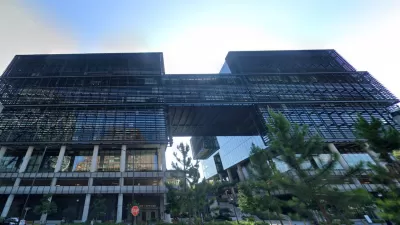In a paradox of green building practices, a new office building can't earn points for building bike facilities unless the storage room has showers and changing rooms, making the price pricier.
"In new office buildings, the U.S. Green Building Council, which certifies buildings as LEED-compliant, awards points only for bike rooms with showers and changing rooms. And in existing buildings, bike rooms also do not automatically earn LEED points because they are based on behavioral changes in tenants - for instance, if a tenant allows employees to telecommute or if a landlord puts in a bike room that gets heavy use."
This article looks at bike storage facilities of various sizes in office buildings throughout Manhattan, including "perhaps the most ballyhooed, the Empire State Building." The 780 sq. ft room was provided as part of a "$550 million renovation of the Empire State Building to make it environmentally friendly." However, the landlord could have provided the same room as a retail outlet at an annual charge of $500 a square foot. And that doesn't account for the additional costs such as the bike racks which can cost thousands of dollars each depending on how many bikes they store.
"You have a lot of buildings here which would like to get LEED points," said Eric Gural, an executive managing director of Newmark Knight Frank who oversees the 1,000-square-foot bike room at 520 Eighth Avenue. "If we didn't have to put a shower in, I think you'd see a lot more bike rooms that would be provided by landlords." (The bike room at 520 Eighth, like all others in this article, lacks a shower.)
Bike storage rooms have become quite popular due to a 2009 law that requires office buildings "with freight elevators to provide bike storage if a tenant asks". Yet the law does not require a separate storage facility, e.g the cyclist could bring it to his/her office, but some landlords find it makes more sense to provide a storage room. The most popular room may be in "the Starrett-Lehigh Building on West 26th Street, where an 1,800-square-foot space holds about 150 bicycles each day."
FULL STORY: A Room of Their Own for 2-Wheeled Commuters

Alabama: Trump Terminates Settlements for Black Communities Harmed By Raw Sewage
Trump deemed the landmark civil rights agreement “illegal DEI and environmental justice policy.”

Planetizen Federal Action Tracker
A weekly monitor of how Trump’s orders and actions are impacting planners and planning in America.

The 120 Year Old Tiny Home Villages That Sheltered San Francisco’s Earthquake Refugees
More than a century ago, San Francisco mobilized to house thousands of residents displaced by the 1906 earthquake. Could their strategy offer a model for the present?

In Both Crashes and Crime, Public Transportation is Far Safer than Driving
Contrary to popular assumptions, public transportation has far lower crash and crime rates than automobile travel. For safer communities, improve and encourage transit travel.

Report: Zoning Reforms Should Complement Nashville’s Ambitious Transit Plan
Without reform, restrictive zoning codes will limit the impact of the city’s planned transit expansion and could exclude some of the residents who depend on transit the most.

Judge Orders Release of Frozen IRA, IIJA Funding
The decision is a victory for environmental groups who charged that freezing funds for critical infrastructure and disaster response programs caused “real and irreparable harm” to communities.
Urban Design for Planners 1: Software Tools
This six-course series explores essential urban design concepts using open source software and equips planners with the tools they need to participate fully in the urban design process.
Planning for Universal Design
Learn the tools for implementing Universal Design in planning regulations.
Clanton & Associates, Inc.
Jessamine County Fiscal Court
Institute for Housing and Urban Development Studies (IHS)
City of Grandview
Harvard GSD Executive Education
Toledo-Lucas County Plan Commissions
Salt Lake City
NYU Wagner Graduate School of Public Service



























